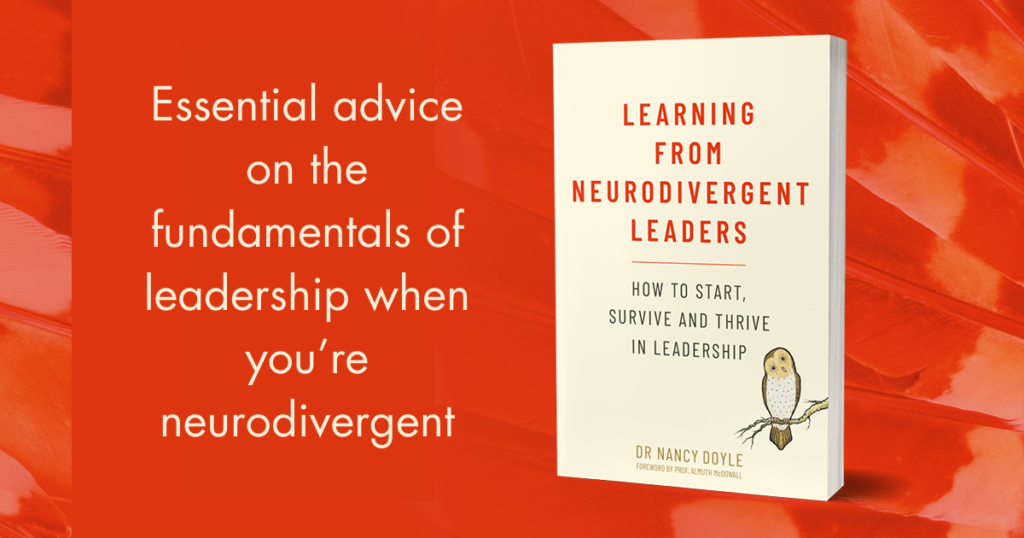
Dr Nancy Doyle is an Organisational Psychologist and the CEO/Founder of the social enterprise Genius Within CIC. Her book Learning from Neurodivergent Leaders empowers leaders to navigate challenges, harness their strengths, and thrive as a neurodivergent leader.
Spoiler alert – I haven’t. With each step up, I have to unpeel a layer of imposter syndrome. However, I have come to dislike the very phrase, since it places the problem at the centre of the individual, rather than within the society which consistently privileges the leadership of those who already come from power and privilege over those who do not. This is a huge mistake, wasting talent and creativity, which the world desperately needs right now.
What I have learned, is where the feeling comes from, how it manifests itself and what I need to do to move through the discomfort. I’ll also be very honest with you, the major difference between when I had a crushing sense of imposter syndrome and not, is the achievement of my PhD. Now a PhD is not for everyone, and not everyone who has one finds it helpful with imposter syndrome. But the point is the achievement of a goal, an ambition, something that you felt was a challenge and you overcame it. I was absent from school for most of my GCSE years. I flunked my A Levels. A PhD was a pipe dream for me, until it wasn’t.
I remember a key turning point in my PhD. After years of sending my supervisor chapter and individual study write ups, only to have her return it with red tracked changes and comments, I finally sent the first draft of the full thesis. I was ready for the red pen. Instead, she just sent a one liner in an email: “now that, Nancy, is a THESIS”. I panicked. Full on panic, had to go for a coaching session with a peer, the works. Unpacking my strong emotional response in coaching, the realisation was this:
· I knew there were still problems with the writing. There were issues with the order, areas where I hadn’t explained things properly, outdated references.
· Had she not picked up on these issues? Did she not think I needed a steer? I felt untethered, like my anchor was missing. I needed the external guardrails to feel safe.
· And then, I realised, that this is the point of a PhD. You are supposed to become your own critic. You are supposed to learn how to spot the edges of your competence and to know the difference between what you know, where you can profess expertise, and what you do not know, and need to learn more or work harder.
· I had shifted from being externally referenced to internally referenced. I had learned to trust my own judgement.
Now, most late diagnosed neurodivergent women have been so gaslighted by adulthood that we have difficulted knowing what is real. Our continual messages through childhood and education is that the problem is us, not them. “You are too sensitive”, “you need to calm down”, “you need to try harder”, “your problem is your moods / menstrual cycle”. This makes us feel that we cannot trust our internal sensations and we need to override them in favour of what other people tell us.
Yet, as I have learned as a neurodiversity specialist psychologist, in fact we ARE sensitive. Neuroimaging shows that our sensory cortex often has more electrical activity than our neurotypical peers. We literally hear, see, smell, taste and/or feel more intensely. We need to soften our environment, not put up with over stimulation. We have tried everything to calm down, but our nervous systems are dealing with a sensory assault. We’ve tried earnestly in every endeavour but we still don’t get the result everyone wants. Our moods are a natural response to this frustration. Our hormones destabilise our sensory experiences. Everything we’ve been told is a gaslight. Is it any wonder that we don’t believe in ourselves when we succeed, and assume it must be a fluke that can fall away at any point? Of course not.
As I wrote my book, ‘Learning from Neurodivergent Leaders’, I was brought to tears many times by the authentic stories of my collaborators and contributors, who shared their similar journeys. Some have PhDs, others have high social media impact, management careers, found their dream jobs. They’ve all been through some version of this journey. My favourite advice comes from Michelle Obama, who once expressed that she had sat at tables with some of the most powerful people in the world, and none were as impressive as their reputations. Instead of asking yourself, “why me”, ask yourself “why not me?”.
Learning from Neurodivergent Leaders is a practical book that empowers leaders to navigate challenges, harness their strengths, and thrive as a neurodivergent leader.